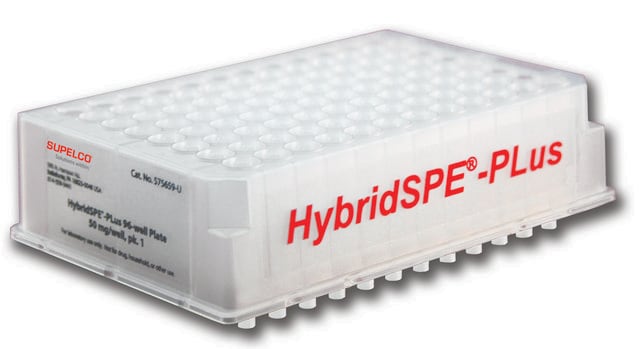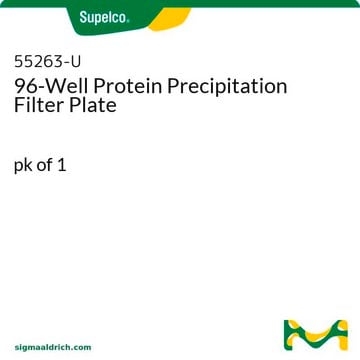575656-U
HybridSPE®-Phospholipid 96-well solid phase extraction (SPE) Plate
Volume 2 mL, bed wt., 50 mg, pk of 1
Sinónimos:
HybridSPE (phospholipid and protein removal) 96-well plate, 50 mg
About This Item
Productos recomendados
product name
HybridSPE®-Phospholipid, 96-well Plate, bed wt. 50 mg, volume 2 mL, pk of 1
Quality Level
product line
HybridSPE®
form
solid
composition
bed wt., 50 mg
packaging
pk of 1
technique(s)
solid phase extraction (SPE): suitable
volume
2 mL
matrix active group
zirconia-based phase
¿Está buscando productos similares? Visita Guía de comparación de productos
General description
The "In-well" and "In-cartridge" precipitation methods are available for the HybridSPE-Phospholipid 96-well version and HybridSPE-Phospholipid Ultra cartridge in which biological plasma/serum is first added to either the well or cartridge, followed by acidified acetonitrile (precipitation agent). After a brief mixing/vortexing step, vacuum is applied. Because the 96-well and Ultra cartridge versions contain a series of low porosity hydrophobic filters/frits, the packed-bed filter/frit assembly acts as a depth filter facilitating the concurrent removal of both phospholipids and precipitated proteins during the extraction process. Standard HybridSPE-Phospholipid cartridges require an "off-line" precipitation method.
Application
- Rapid analysis of 65 pharmaceuticals and 7 personal care products in plasma and whole-body tissue samples of fish using acidic extraction, zirconia-coated silica cleanup, and liquid chromatography-tandem mass spectrometry: This study discusses the advanced application of chromatography and mass spectrometry, which could involve the use of technologies like HybridSPE®-Phospholipid for sample preparation, specifically for rapid analysis in biological matrices (Tanoue et al., 2020).
- Multi LC-MS/MS and LC-HRMS Methods for Determination of 24 Mycotoxins including Major Phase I and II Biomarker Metabolites in Biological Matrices from Pigs and Broiler Chickens: Demonstrates how LC-MS/MS, potentially incorporating HybridSPE®-Phospholipid technology for sample cleanup, facilitates the sensitive and accurate detection of mycotoxins in complex biological samples (Lauwers et al., 2019).
- Evaluation of an Ion Trap Toxtyper Liquid Chromatography With An Ion Trap Mass Spectrometric Instrument (Toxtyper) for Drug of Abuse Screening in Oral Fluid: Explores the utility of specific LC-MS/MS methodologies which could integrate HybridSPE®-Phospholipid for bioanalytical sample cleanup, enhancing drug screening accuracy (Plecko et al., 2018).
- Effective phospholipid removal from plasma samples by solid phase extraction with the use of copper (II) modified silica gel cartridges: This research potentially aligns with the use of HybridSPE®-Phospholipid technologies for phospholipid removal, focusing on enhancing the purity and quality of chromatography samples (Flieger et al., 2017).
- Liquid chromatography mass spectrometry determination of perfluoroalkyl acids in environmental solid extracts after phospholipid removal and on-line turbulent flow chromatography purification: Illustrates a specialized application of chromatography and mass spectrometry where HybridSPE®-Phospholipid could be applied to improve the analysis of environmental samples by efficient phospholipid removal (Mazzoni et al., 2016).
Features and Benefits
- Merges the simplicity of protein precipitation and the selectivity of SPE via the targeted removal of phospholipids
- Reduce ion-suppression through the complete removal of phospholipids and precipitated proteins
- 2-3 step generic procedure
- Minimal to no method development
- Available in 96-well and 1 mL cartridge dimensions
Legal Information
Application
Related product
Storage Class
11 - Combustible Solids
wgk_germany
WGK 3
flash_point_f
Not applicable
flash_point_c
Not applicable
Elija entre una de las versiones más recientes:
¿Ya tiene este producto?
Encuentre la documentación para los productos que ha comprado recientemente en la Biblioteca de documentos.
Los clientes también vieron
Artículos
This Sigma-Aldrich article continues to detail new methodology for the analysis of Vitamin D metabolites using HybridSPE-Phospholipid technology.
This study demonstrates the impact of various mobile phase modifiers on the separation; formate modifiers outperform acetate in terms of MS signals (or sensitivity) and chromatographic resolution.
An article focusing on ion-suppression and phospholipid contamination and some of their major causes and difficulties.
This Sigma-Aldrich article discusses how the HybridSPE-Phospholipid Technology works and how the phospholipids are removed.
Protocolos
This study demonstrates the analysis of Warfarin in plasma samples utilizing chiral and achiral (reversed-phase) LC-MS and effective sample prep to remove endogenous phospholipids
A simple method to enrich phospholipids from plasma samples, involving a HybridSPE-PPT 96-well plate that both retains phospholipids and removes precipitated proteins.
The conversion of clinical methods to LC/MS/MS offers advantages; however, is accompanied by a few limitations, notably interference effects from the endogenous sample matrix.
Chromatograms
application for HPLCapplication for SPE, application for LC-MSapplication for HPLCapplication for HPLCMostrar másNuestro equipo de científicos tiene experiencia en todas las áreas de investigación: Ciencias de la vida, Ciencia de los materiales, Síntesis química, Cromatografía, Analítica y muchas otras.
Póngase en contacto con el Servicio técnico












